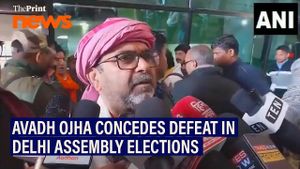Atishi of the Aam Aadmi Party (AAP) has successfully retained her seat from the Kalkaji constituency during the 2025 Delhi Assembly elections, marking another significant win for the leading party. Atishi emerged victorious over her main opponent, Ramesh Bidhuri of the Bharatiya Janata Party (BJP), by securing 52,154 votes—a margin of 3,521 votes. The results were confirmed by the Election Commission after the twelfth round of counting.
For Atishi, this victory is particularly noteworthy as it reinforces AAP's continuing influence within the Kalkaji constituency, which has shown conflicting trends over previous elections. Ramesh Bidhuri, who garnered 48,633 votes, had aimed to capitalize on the opposition's performance across Delhi, asserting earlier his belief in AAP's imminent downfall. Meanwhile, Congress candidate Alka Lamba trailed significantly, achieving only 4,392 votes, underscoring her party's persistent struggles within the capital.
The elections, held on February 5, 2025, recorded approximately 60.39% voter turnout, illustrating the engaging nature of this electoral battle. The lead-up to the elections was marked by aggressive campaigning, featuring stark rhetoric from both main candidates. Despite the challenges faced by AAP nationally, Atishi's win was hailed as 'a silver lining' amid reports of other AAP candidates, including party chief Arvind Kejriwal, facing defeats.
During the campaign, both Atishi and Bidhuri exchanged heated barbs. Bidhuri, who has been active in Delhi politics as both MLA and MP, sparked controversy by attacks targeting Atishi’s personal background and her decision to change her name from Marlena to Singh. According to reports on the campaign, Atishi expressed her concerns over such personal attacks, claiming, "This was no ordinary election but a battle between good and evil." After the victory, she expressed her gratitude to the electorate and emphasized the need for continued diligence against the BJP's perceived aggressive tactics.
This win is portrayed as particularly pivotal for Atishi and AAP, as their previous involvement included considerable achievements, especially within educational reforms under Atishi's leadership. Following the results, she articulated the need to maintain efforts against BJP dominance, stating, "We accept the people's mandate but it’s not the time for celebration; it’s time for continued vigilance and integrity for Delhi."
Notably, voter sentiment seemed to favor Atishi's previous success within the constituency, where she had won with 55,897 votes during the 2020 elections. That year, her win had showcased the increasing popularity of AAP which had also successfully secured other significant constituencies across the city.
Despite AAP's local successes, the party is facing considerable challenges nationally, as reflected by the concurrent losses experienced by other prominent AAP leaders including Kejriwal himself, who lost his seat to Parvesh Verma of the BJP. This trend raises questions about AAP's strategies going forward, especially how they will reconcile local leadership with national perceptions. The perceived effectiveness of their local governance as highlighted by Atishi could prove to be contrasting with the realities of the national election outcomes, which have seen growing support for BJP.
Looking back at the recent trends, it is clear the BJP remains a fierce competition within the Delhi Assembly scene. Ramesh Bidhuri's assertion at the polls he anticipated AAP would be "eliminated" leaves room for speculation on future contests and the potential impact of BJP policies on Delhi governance.
Going forward, the continued examination of AAP's response to this electoral climate will be pivotal. Atishi's victory presents her with both opportunities and challenges as she navigates her dual role as both leader and representative of her constituency. With the changing political dynamics, the focus will now shift to how AAP consolidates its power, particularly against the backdrop of BJP’s strong campaigning strategies and fluctuated public sentiment.
Indeed, the results from Kalkaji are indicative not only of district preferences but also can serve as reflections of larger trends influencing the electoral patterns across Delhi. The aftermath of the elections will be closely watched, with various political commentators speculating on what this means for the future composition of power within the Delhi Assembly.



